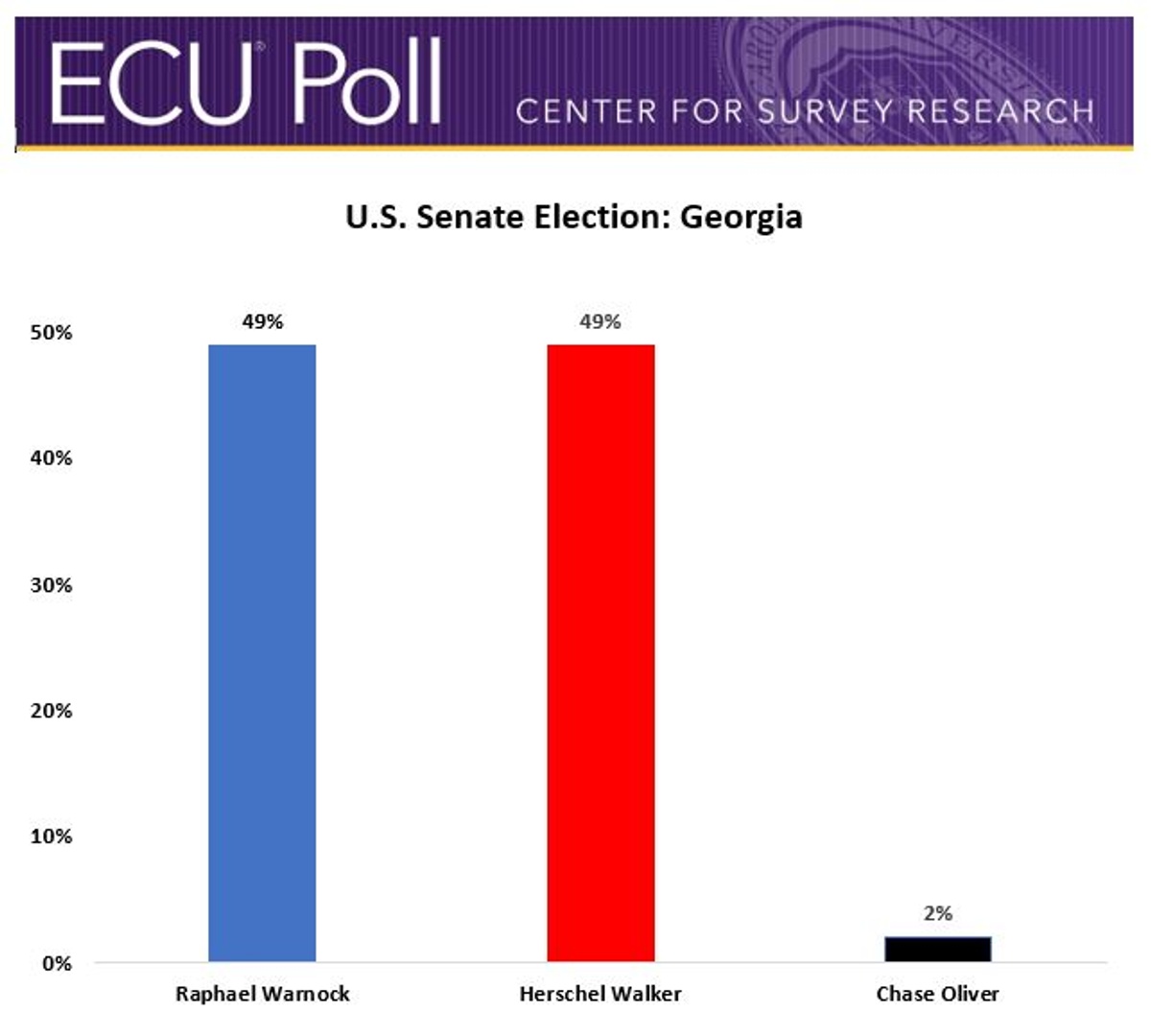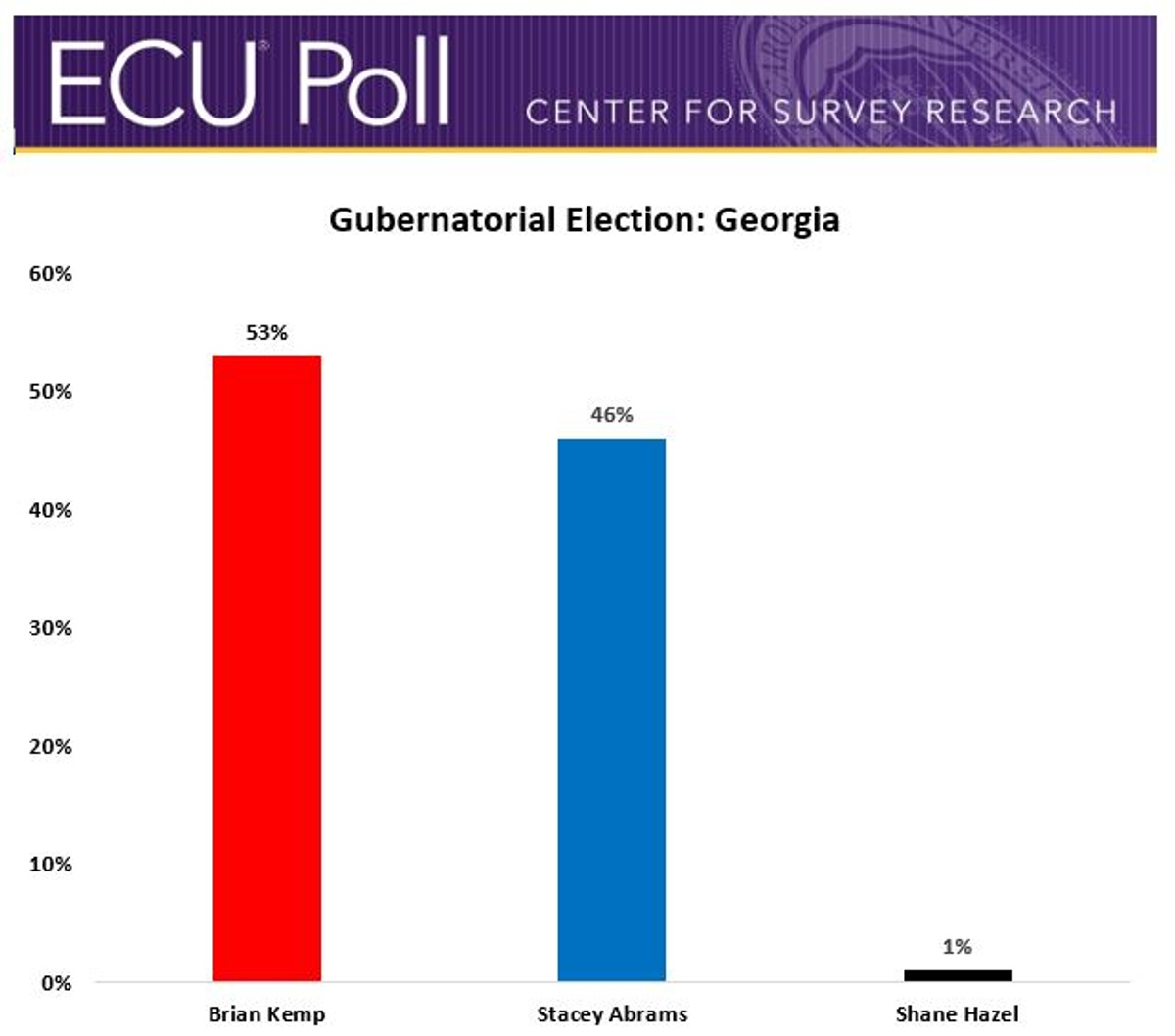A recent ECU Poll of the U.S. Senate election in Georgia shows Democrat Raphael Warnock tied with Republican challenger Herschel Walker, 49% to 49%, among likely voters (and those who already voted), with 2% supporting Libertarian Chase Oliver. In the race for Governor of Georgia, Republican Brian Kemp leads Democrat Stacey Abrams, 53% to 46%, with 1% combined either undecided or supporting Libertarian Shane Hazel. (The poll was conducted November 2-5, 2022, among 1,077 likely voters and those who have already voted in Georgia, with a Credibility Interval, similar to a poll’s margin of error of ±3.5 percentage points.)

The results of the poll reveal some significant divisions within the electorate. Both Republican candidates draw strong support from working-class white voters (defined as those without a four-year college degree). Among these working-class white voters, Walker is ahead of Warnock by over 60 percentage points (80% to 19%), while Kemp holds a significant 84% to 15% advantage over Abrams. Both Republicans also lead among white voters with a four-year college degree. Among this segment, Walker tops Warnock, 57% to 41%, while Kemp leads Abrams, 62% to 38%. By comparison, Warnock and Abrams are well ahead among African American voters: Warnock tops Walker, 89% to 11%, and Abrams is ahead of Kemp, 88% to 12%.

The results of the poll also shows divisions between men and women. Walker tops Warnock, 56% to 43%, among male voters, while Warnock leads Walker, 54% to 43% among female voters. In the governor’s election, Kemp holds a decisive 60% to 39% advantage over Abrams among men. Women are more closely split among the two candidates, with Abrams up 51% to 48% over Kemp.
By region, Warnock’s advantage is largest in the Atlanta metro area (84% to 15%). He also leads in the Atlanta suburbs (52% to 47%). Walker tops Warnock in North Georgia (69% to 25%), Coastal/South Georgia (64% to 33%), and Central Georgia (55% to 44%). Similar to Warnock, Abrams leads by a wide margin in the Atlanta metro area (82% to 18%); however, she and Kemp are tied in the Atlanta suburbs (50% to 50%). Kemp leads Abrams in North Georgia (78% to 19%), Coastal/South Georgia (68% to 32%), and Central Georgia (61% to 39%).
In addition to the Senate and gubernatorial races, respondents were asked how they plan to vote in their U.S. congressional district races. The poll’s results show that 51% of voters say they intend to vote for the Republican candidate, while 46% say they will vote for the Democratic candidate. The five-point Republican advantage in Georgia is higher than the national average, which currently shows a three-point Republican advantage.
Complicating matters for Democrats running for office in Georgia are the low approval ratings for President Joe Biden. Currently, just 36% of likely voters in Georgia approve of President Biden’s job performance, while 55% express disapproval.
In assessing the results of the poll, Peter Francia, Director of the Center for Survey Research and professor of political science at East Carolina University, commented: “The latest numbers from the ECU Poll suggest that the Georgia Senate contest is simply too close to call. The final vote tally could go either way, and there is a very real chance that neither candidate will win the majority of the vote. A runoff Senate election in Georgia seems entirely possible — even likely.”
Methodology
This poll was conducted on November 2-5, 2022. The sample consisted of 1,077 likely voters in Georgia, with a Credibility Interval (CI), similar to a poll’s margin of error (MOE) of ±3.5 percentage points. It is important to remember that subsets based on gender, race, education, and age have higher margins of error, as the sample size is reduced. To ensure the sample was representative of the mid-term electorate, the data were weighted by gender, age, education, race, region, and election modeling based on previous statewide elections in Georgia. Data were collected using a cell phone sample of SMS-to-web (n=518), an Interactive Voice Response (IVR) system of landlines only (n=359), and an online panel provided by Bovitz (n=200).



